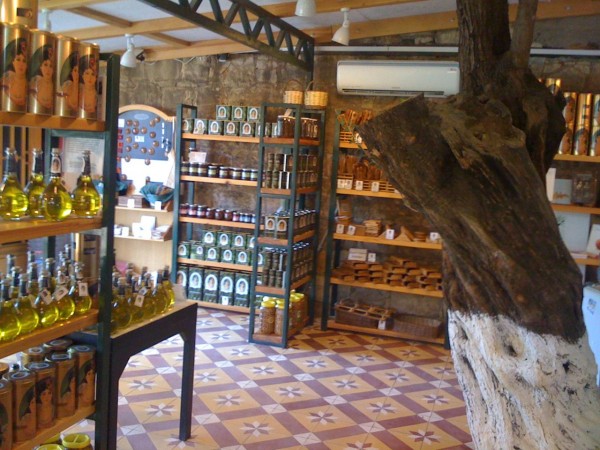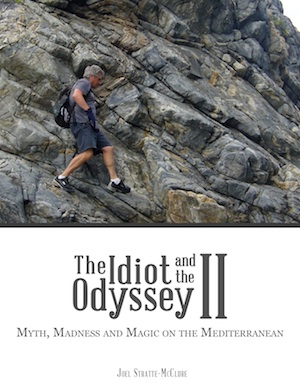Marilyn Hagerty — the 85-year-old Internet-viral food critic and columnist from North Dakota who became instantly famous (Google her) this month following her recent review of The Olive Garden in Grand Forks — was among the first US critics to write about “The Idiot and the Odyssey: Walking the Mediterranean.”
Below is her article from the Grand Forks Herald (ND) on January 4, 2009:
“Walking The Mediterranean Is A Vicarious Pleasure”
During the holidays just past, I kept stealing away. I went on a walking trip with Joel Stratte-McClure around the Mediterranean Sea.
That is, I made my way around the sea by way of Stratte-McClure’s new book, “The Idiot and the Odyssey: Walking the Mediterranean.” The book was a Christmas gift. And although it is stuffed with ancient history, it offers enough action to keep even a lazy reader like me going.
I wanted the book because the author was born in Grand Forks. He is a grandson of the late M.M. Oppegard, who was part owner, editor and publisher of the Herald from 1929 to 1969. And from his writing, I can see Stratte-McClure is a chip off the old block. He is wise, witty and sometimes troubled.
He made his trek around the Mediterranean after three decades as a journalist in Europe, based usually in France. He has written for publications such as People and Time magazines, the London Times and the International Herald-Tribune in Paris. His book is published by Fast Thinking Book Series and recently was released in Australia. We found it on amazon.com.
One reviewer said readers will be glad they came along on the journey by a whimsical author and serial hiker in the midst of a mid-life crisis. Author Tony Rocca calls it a journey of discover that is both entertaining and inspirational. Another says Stratte-McClure delivers an endless stream of wit and wisdom with selfless honesty.
The book is indeed a story of the Mediterranean seaside today with flashbacks into history and reflections on life by a person scaling cliffs, walking paths, and meeting people along the way. Stratte-McClure describes the food and the hotels where he stopped while hiking more than 2,700 miles in the course of the book. While reading in airports and my living rooms, I was transported to parts of the world where I have traveled but not really known. Author Tony Perrottet says the book provides a highly entertaining perspective of the world’s oldest and greatest journey, conjured millennia ago by Homer.
Yes, the trip by Stratte-McClure is a far cry from the poetry of “The Iliad” and “The Odyssey.” Still, some of the words are brought to life in this book.
“The Idiot and the Odyssey” begins on the French Riviera and continues on to Marseille. As he makes his way along his MedTrek, Stratte-McClure tells of nudists, Buddhists and even a fish called Joel. He walked into a cow in Spain and around 365 curves to reach the Gold Coast. During his walks, Stratte-McClure welcomed his companions including his son, Luke. Much of the time he preferred walking alone with his thoughts and meeting people along the way. He had a death-defying fall in Morocco and lost his passport and money – and his sanity – there.
Then, he marched through Monaco to Italy, giving insights on the people as he traveled along.
While his book is not intended to be a travel guide, Stratte-McClure offers advice in an addendum to his book. In it, he points out that a long-distance trek demands a balanced mental, physical and spiritual attitude to achieve and maintain the right rhythm. He writes, “Once you establish your own cadence, a 20-to-30 kilometer march will be a physical and psychological walk in the park, though many hikers tend to hit a wall between 40 and 50 kilometers.
“Once I get going I rarely stop for more than 15 minutes, even for lunch that usually consists of fresh produce that I buy in local markets or swipe from the hotel breakfast buffet,” he says. “On the trail, I often find myself doing pushups, planks or stretching exercises to limber up and stretch while toting a heavy, or even a light, backpack.”
Stratte-McClure says it’s difficult to get lost if you just keep the sea on your left or right. It is helpful to have a map and start the day with a local geography review. Choose the right season for your hike to get both favorable weather and lowest prices. Though there’s more daylight, summer on the Mediterranean is usually too hot. Tourists are omnipresent and accommodations are difficult to find.
He continues, “If you wind up at some of the places mentioned in the book, you wont’ regret is. I think everyone should stay in a monastery, drop into a nudist camp and sleep on a beach. And it’s a kick to find a cheap hotel on the sea, rent a fairly primitive square for just a few buck and, occasionally, splurge if you’re really wiped out.”

Is Marilyn ready to review olives in Küçükkuyu, Turkey?




 Follow
Follow